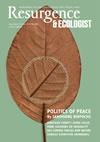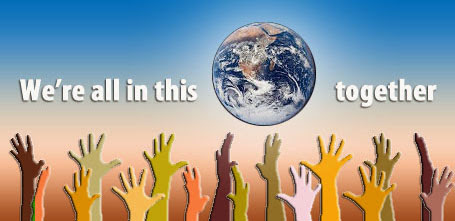For this as for all else, we need harmony within ourselves, practising humility and seeking to abandon ego: the idea encapsulated as ‘soul’. Of course, too, we need to seek harmony with the rest of humanity – ‘society’ – and indeed to treat all creatures with the same compassion.
All this should be second nature, yet it is the diametric opposite of the worldview that came out of the West and now dominates the whole world: entirely anthropocentric; entirely materialistic; crudely ‘rational’ in a calculating kind of way; employing science to control and even ‘conquer’ Nature; and locking us all into no-holds-barred competition, which in essence and commonly in practice has no truck with compassion at all.
So begins the review of Satish Kumar's recent book by Colin Tudge in the recent issue of Resurgence.
 The issue includes many gems including pieces by Charles Eisenstein and Samdhong Ripoche. The topic of the issue that arrived in my mailbox over the weekend, "The Politics of Peace", has been coursing through my veins more intensely of late, perhaps because of the events in Gaza, Ferguson, Missouri, Ukraine, Syria, Iraq and my own involvement with our Peace Education Center.
The issue includes many gems including pieces by Charles Eisenstein and Samdhong Ripoche. The topic of the issue that arrived in my mailbox over the weekend, "The Politics of Peace", has been coursing through my veins more intensely of late, perhaps because of the events in Gaza, Ferguson, Missouri, Ukraine, Syria, Iraq and my own involvement with our Peace Education Center.More likely it's tied to the just completing a short book by Barry Gan, Violence and Nonviolence: An Introduction. In it, Gan, a professor of philosophy and director of the Center for Nonviolence at St. Bonaventure University, succinctly lays out five myths of violence:
- Myth of Physical Violence
- Myth of Good Guys and Bad Guys
- Myth of Necessary Violence
- Myth of Effective Punishment
- Myth of Nonviolence as Ineffective
Gan sets up this critique of myths of violence with a short story about looking for a missing wallet. After searching endlessly in all the wrong places, they eventually retrace the actions that preceded loss of the wallet.
"The point is that when we look for something we have lost, we first decide where we might have displaced it, and then begin to search. However, if we are wrong in our assumptions about where we lost it, we fail to find it. Our likelihood of success is determined by our initial assumptions. This observation illustrates the central and noncontroversial point of the first part of this book: that our assumptions govern or direct our individual behaviors, and the assumptions of a community or society govern or direct its social, political and economic behaviors and policies." (p.3)
In the 111 pages that follow, Gan not only addresses each of the five myths (false assumptions) he gives us a concise, jargon-free review of the alternative. Yes Margaret Thatcher, There Is an Alternative!!
Like Satish Kumar's new book listed above, Gan concludes that peace/nonviolence must come from the inside out. There is a fearlessness in this approach that is hard to come by for most of us.
I find it hard to fathom that so little of the curriculum in our schooling from K-12 through PhD really gives much attention to these assumptions about violence or the POSSIBILITY that there might be a better way. As I have written before we spend billions to prepare for war and almost nothing to understand and nurture peace. More money funds university research on weapons than on approaches to resolving conflict. Where we spend our money shows what we believe in.
After reading, Gans, Ripoche, Eisenstein, and Kumar, and listening to this Tom Paxton classic song over the weekend for the first time in years, I think they have it right! This must come from the inside out. How does our educational system foster that kind of personal development? It's currently all about job and career. So until we fix that, we'll keep churning out 'educated' people who believe that violence is a given and we need to protect ourselves from others - humans, animals, nature. Ah, the myth of independence strikes again.
Now how to live fearlessly, committed to a world without violence, therein lies the rub. One thought at a time. Here's to you dear reader - may you have the strength of your nonviolent convictions!
Peace
Peace will
Peace will come
And let it begin with me
We
We need
We need peace
And let it begin with me
Oh, my own life is all I can hope to control.
Oh, let my life be lived for the good,
Good of my soul.
Let it bring
Peace
Sweet peace
Peace will come
And let it begin with me

No comments:
Post a Comment